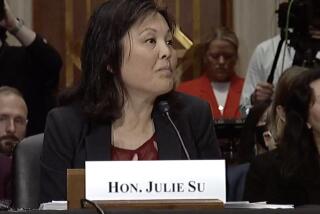Energy secretary refuses to apologize over Solyndra loan
- Share via
Reporting from Washington — Energy Secretary Steven Chu is a physicist, not a politician, but he was unflappable under attack from Republicans and refused to apologize for a $535-million loan guarantee given to now-bankrupt solar equipment maker Solyndra.
In his first appearance before Congress since the Solyndra controversy broke nearly three months ago, Chu firmly pushed back against allegations that political favoritism and bureaucratic incompetence led his agency to approve the Solyndra loan guarantee.
“Was there incompetence?” Chu said in response to Michigan Republican Fred Upton’s request for an apology. “Was there any influence of a political nature? So I would say no. It is extremely unfortunate what has happened to Solyndra.”
Chu is the highest-level Obama administration member so far to testify about his agency’s role in the decision to back the Fremont, Calif., manufacturer, which closed its doors at the end of August.
Upton, the committee’s chairman, had framed the hearing as an inquiry into Chu’s involvement. “What did Secretary Chu know about the situation at Solyndra, when did he know it and how did he act on this information, if at all?”
Chu said he knew few of the details about Solyndra until the company began to falter late last year and needed its loan guarantee restructured. Many of the decisions about the loan were made by career civil servants, emails have shown.
Chu, a Nobel prize winner and Washington outsider, parried often-repetitive questions over the nearly five hours of the hearing. During his testimony, he made clear that he had little hope of recovering most of the money backed by the Energy Department’s guarantee.
Solyndra was once the darling of the venture capital world, collecting accolades from MIT and the Wall Street Journal and more than $1 billion in private investment for its innovative solar technology.
Chu, reiterating explanations of others, said the company failed after demand for solar equipment slackened and panel prices plummeted from the effects of China’s heavy subsidies for its own manufacturers. House Republicans assert that Chu should have seen such a fall coming.
Congress has acknowledged that some loan guarantee recipients might fail and has appropriated almost $10 billion over the last two years to cover losses from the Energy Department’s loan portfolio.
Republicans have insisted that Solyndra received its federal guarantee because its biggest investors included a major Obama campaign donor, George Kaiser. Kaiser has denied ever speaking to the administration about Solyndra.
The Republicans have pointed to emails suggesting that some administration officials had raised concerns years ago about Solyndra’s health and that the administration ignored those warnings. The White House has denied those claims.
Some Republicans suggested that Chu should resign, an idea he brushed aside.
Republicans zeroed in on alleged red flags that were raised after the Energy Department approved Solyndra’s loan guarantee in September 2009.
They focused on a May 2010 email from Steve Westly, a major venture capitalist, to top presidential advisor Valerie Jarrett warning her of Solyndra’s lack of long-term viability. That warning came before a planned trip by Obama to the company. Chu testified that the Energy Department did not consider the company shaky at that time.
Lawmakers also asked about an Oct. 30, 2010, email from a Solyndra investment advisor that said department officials were pressuring the company to delay an announcement about impending layoffs until Nov. 3, the day after the mid-term elections.
Chu said he did not approve of such tactics, adding that it was “not a proper way to do business.” He said he would ask the Energy Department’s general counsel to look into the legislators’ concerns.
The White House has authorized an independent investigation of the loan guarantee program, and the Justice Department’s and the Energy Department’s inspectors general are investigating Solyndra itself.
More to Read
Inside the business of entertainment
The Wide Shot brings you news, analysis and insights on everything from streaming wars to production — and what it all means for the future.
You may occasionally receive promotional content from the Los Angeles Times.











